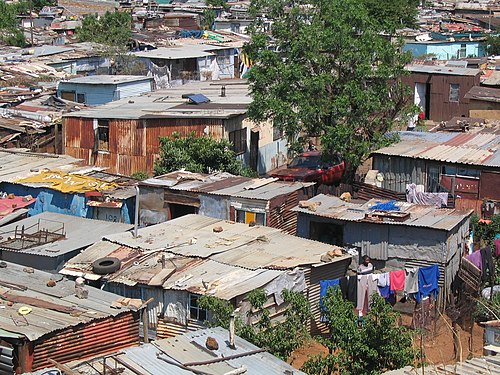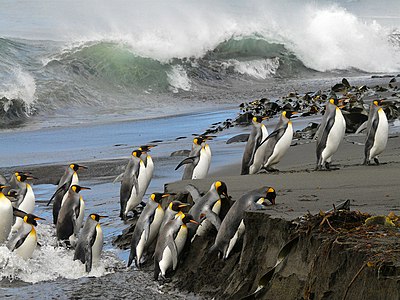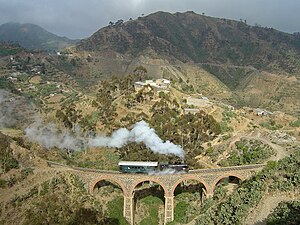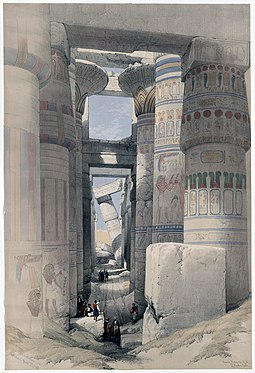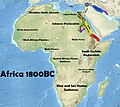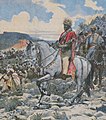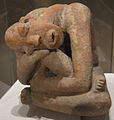
Back Portal:Afrika ALS بوابة:إفريقيا Arabic ܬܪܥܐ:ܐܦܪܝܩܐ ARC Portal:Afrika Azerbaijani Партал:Афрыка BE-X-OLD Портал:Африка Bulgarian دەروازە:ئەفریقا CKB Portál:Afrika Czech Portal:Afrika German Portal:Afrika DIQ



Africa is the world's second largest and second-most populous continent after Asia. At about 30.3 million km2 (11.7 million square miles) including adjacent islands, it covers 20% of Earth's land area and 6% of its total surface area. With 1.4 billion people0 as of 2021, it accounts for about 18% of the world's human population. Africa's population is the youngest amongst all the continents; the median age in 2012 was 19.7, when the worldwide median age was 30.4. Despite a wide range of natural resources, Africa is the least wealthy continent per capita and second-least wealthy by total wealth, ahead of Oceania. Scholars have attributed this to different factors including geography, climate, lack of democracy, tribalism, corruption, colonialism, the Cold War, and neocolonialism. Despite this low concentration of wealth, recent economic expansion and the large and young population make Africa an important economic market in the broader global context.
Africa straddles the equator and the prime meridian. It is the only continent to stretch from the northern temperate to the southern temperate zones. The majority of the continent and its countries are in the Northern Hemisphere, with a substantial portion and a number of countries in the Southern Hemisphere. Most of the continent lies in the tropics, except for a large part of Western Sahara, Algeria, Libya and Egypt, the northern tip of Mauritania, and the entire territories of Morocco, Ceuta, Melilla, and Tunisia which in turn are located above the tropic of Cancer, in the northern temperate zone. In the other extreme of the continent, southern Namibia, southern Botswana, great parts of South Africa, the entire territories of Lesotho and Eswatini and the southern tips of Mozambique and Madagascar are located below the tropic of Capricorn, in the southern temperate zone.
Africa is highly biodiverse; it is the continent with the largest number of megafauna species, as it was least affected by the extinction of the Pleistocene megafauna. However, Africa also is heavily affected by a wide range of environmental issues, including desertification, deforestation, water scarcity and pollution. These entrenched environmental concerns are expected to worsen as climate change impacts Africa. The UN Intergovernmental Panel on Climate Change has identified Africa as the continent most vulnerable to climate change.
The history of Africa is long, complex, and varied, and has often been under-appreciated by the global historical community. Africa, particularly Eastern Africa, is widely accepted as the place of origin of humans and the Hominidae clade (great apes). The earliest hominids and their ancestors have been dated to around 7 million years ago, including Sahelanthropus tchadensis, Australopithecus africanus, A. afarensis, Homo erectus, H. habilis and H. ergaster—the earliest Homo sapiens (modern human) remains, found in Ethiopia, South Africa, and Morocco, date to circa 233,000, 259,000, and 300,000 years ago, respectively, and Homo sapiens is believed to have originated in Africa around 350,000–260,000 years ago. Africa is also considered by anthropologists to be the most genetically diverse continent as a result of being the longest inhabited. (Full article...)
Selected article –

The number of languages natively spoken in Africa is variously estimated (depending on the delineation of language vs. dialect) at between 1,250 and 2,100, and by some counts at over 3,000. Nigeria alone has over 500 languages (according to SIL Ethnologue), one of the greatest concentrations of linguistic diversity in the world. The languages of Africa belong to many distinct language families, among which the largest are:
- Niger–Congo, which include the large Atlantic-Congo and Bantu branches in West, Central, Southeast and Southern Africa.
- Afroasiatic languages are spread throughout Western Asia, North Africa, the Horn of Africa and parts of the Sahel.
- Saharan, Nilotic and Central Sudanic languages (previously grouped under the hypothetical Nilo-Saharan macro-family), are present in East Africa and Sahel.
- Austronesian languages are spoken in Madagascar and parts of the Comoros.
- Khoe–Kwadi languages are spoken principally in Namibia and Botswana.
- Indo-European languages, while not indigenous to Africa, are spoken in South Africa and Namibia (Afrikaans, English, German) and are used as lingua francas in Liberia and the former colonies of the United Kingdom (English), former colonies of France and of Belgium (French), former colonies of Portugal (Portuguese), former colonies of Italy (Italian), former colonies of Spain (Spanish) and the current Spanish territories of Ceuta, Melilla and the Canary Islands and the current French territories of Mayotte and La Réunion.
Featured pictures –
Did you know (auto-generated) -

- ... that the bronze statue atop Thomas Eyre Macklin's 1907 South African War Memorial in Newcastle became known as the "Dirty Angel"?
- ... that cosmetologist Pauline Brown Humphrey opened a beauty shop for African-American women in the Women's Army Corps in Fort Des Moines?
- ... that Charles Larson's The Emergence of African Fiction was an early attempt to get to an "African aesthetic", but in the eyes of critics fell short and implicitly employed European standards?
- ... that in 2019 the South African army's Natal Carbineers were renamed the Ingobamakhosi Carbineers, after a Zulu regiment that had fought against them at the 1879 Battle of Isandlwana?
- ... that Bill Pinkney was the first African American to sail around the world solo via the Cape of Good Hope and Cape Horn?
- ... that the son of an engine fitter from England became Director of Education in part of modern-day South Africa for almost twenty years?
Categories
Selected biography –
Pope Gelasius I was the bishop of Rome from 1 March 492 to his death on 19 November 496. Gelasius was a prolific author whose style placed him on the cusp between Late Antiquity and the Early Middle Ages. Some scholars have argued that his predecessor Felix III may have employed him to draft papal documents, although this is not certain.
During his pontificate he called for strict Catholic orthodoxy, more assertively demanded obedience to papal authority, and, consequently, increased the tension between the Western and Eastern Churches. Surprisingly, he also had cordial relations with the Ostrogoths, who were Arians (i.e. Non-trinitarian Christians), and therefore perceived as heretics from the perspective of Nicene Christians. (Full article...)Selected country –
 |
||

| ||
Libya (Arabic: ليبيا Lībiyā), officially the State of Libya, is a country in North Africa. Bordering the Mediterranean Sea to the north, Libya lies between Egypt to the east, Sudan to the southeast, Chad and Niger to the south, and Algeria and Tunisia to the west. With an area of almost 1.8 million square kilometres (700,000 sq mi), 90% of which is desert, Libya is the fourth largest country in Africa by area, and the seventeenth largest in the world. The capital, Tripoli, is also Libya's largest city. The three traditional parts of the country are Tripolitania, the Fezzan and Cyrenaica.
Libya was ruled by Muammar Gaddafi under the Great Socialist People's Libyan Arab Jamahiriya for 42 years before he was overthrown and killed by rebel forces during the 2011 Libyan civil war. From 2014 to 2020 the country endured a second civil war between rival governments based in Tripoli and Tobruk. The Libyan economy has historically depended primarily upon revenues from the oil sector, and under Gaddafi's government these oil revenues combined with a small population gave Libya one of the highest GDPs per person in Africa. (Read more...)
Selected city –

Kano (Ajami: كَنُواْ) is a city in northern Nigeria and the capital of Kano State. It is the second largest city in Nigeria after Lagos, with over ten million citizens living within 449 km2 (173 sq mi). Located in the Savanna, south of the Sahel, Kano is a major route of the trans-Saharan trade, having been a trade and human settlement for millennia. It is the traditional state of the Dabo dynasty who have ruled as emirs over the city-state since the 19th century. Kano Emirate Council is the current traditional institution inside the city boundaries of Kano, and under the authority of the Government of Kano State.
The city is one of the seven medieval Hausa kingdoms. The principal inhabitants of the city are the Hausa and Fulani people. Centuries before British colonization, Kano was strongly cosmopolitan with settled populations of Arab, Tuareg, Kanuri and remains so with the Hausa language spoken as a lingua-franca by over 70 million speakers in the region. (Full article...)In the news
- 12 February 2024 –
- Two boats collide on the Congo River near Kinshasa, Democratic Republic of the Congo; with the death toll remains unclear. (AP)
- 11 February 2024 – 2023 Africa Cup of Nations
- In association football, hosts Ivory Coast win their third Africa Cup of Nations by defeating Nigeria 2–1 in the final. Sébastien Haller scores the winning goal in the 81st minute. (The Guardian)
- 10 February 2024 – Somali civil war
- Four Emirati soldiers and a Bahraini military officer are killed, while ten other people are injured, when a soldier opens fire at a military base in Mogadishu, Somalia, before being killed in the ensuing shootout. Al-Shabaab claims responsibility. (AP)
- 10 February 2024 –
- A Eurocopter EC130 helicopter crashes near Nipton, California, United States, killing all the six people on board, including Nigerian banker Herbert Wigwe. (CBS News)
- 10 February 2024 – 2023–2024 Senegalese protests
- Violent protests occur in Senegal following an announcement by President Macky Sall that presidential elections have been delayed from February 25 to December 15. (Sky News)
- 9 February 2024 –
- At least 18 people are killed during a collision between a bus and a truck on a road in Kinshasa, Democratic Republic of the Congo. (AP)
Updated: 16:33, 14 February 2024
General images -
Africa topics
More did you know –
- ... that Safi Faye's 1975 film Kaddu Beykat was the first commercially distributed feature film made by a Sub-Saharan African woman?
- ... that legendary princess Yennenga, the "mother" of the Mossi people, was such a great warrior that her father refused to allow her to marry?
- ... that Safi Faye is a Senegalese film director whose work is better known in Europe than in her native Africa?
- ...that Mohamed Camara's 1997 film Dakan was the first West African film to explore homosexuality?
Related portals
Major Religions in Africa
North Africa
West Africa
Central Africa
East Africa
Southern Africa
Associated Wikimedia
The following Wikimedia Foundation sister projects provide more on this subject:
-
Commons
Free media repository -
Wikibooks
Free textbooks and manuals -
Wikidata
Free knowledge base -
Wikinews
Free-content news -
Wikiquote
Collection of quotations -
Wikisource
Free-content library -
Wikispecies
Directory of species -
Wikiversity
Free learning tools -
Wikivoyage
Free travel guide -
Wiktionary
Dictionary and thesaurus

